UK Summons Islamic Republic’s Envoy Over Threats To Journos
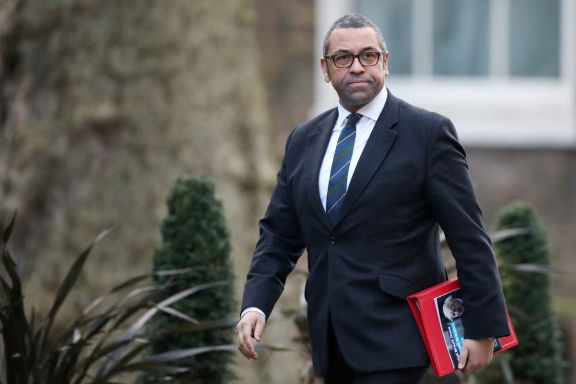
Britain has summoned the Islamic Republic’s chargé d’affaires over threats to UK-based journalists after Iran International’s journos were notified of "imminent" threats to their lives.

Britain has summoned the Islamic Republic’s chargé d’affaires over threats to UK-based journalists after Iran International’s journos were notified of "imminent" threats to their lives.
In a statement on Friday, Foreign Secretary James Cleverly said, "I summoned the Iranian representative today to make clear that we do not tolerate threats to life and intimidation of any kind towards journalists, or any individual, living in the UK."
“The UK will always stand up to threats from foreign nations,” read the statement.
Criticizing the Iranian regime, it added that the Islamic Republic responded to widespread internal protests with the suppression of freedom of expression and the targeting of media outlets operating in Iran.
It noted that more than 40 journalists have been arrested and detained since the current wave of protests began following the death in custody of 22-year-old Mahsa Amini. The journalists who reported the circumstances around her death have been also arrested.
The Metropolitan Police formally notified two of our journalists about an imminent, credible and significant risk to their lives and those of their families.
Earlier in the week, Iran’s intelligence minister implicitly threatened the UK of terrorist operations after the country decried the attempted menacing acts.
Iranian vice president Mohammad Hosseini also emphasized Thursday that the Islamic Republic now considers Iran International as a terrorist network. Iranian intelligence also arrested Elham Afkari Thursday, claiming that she was “an agent” of Iran International. Afkari is the sister of Iranian wrestler Navid Afkari who was executed in September 2020, after participating in protests.
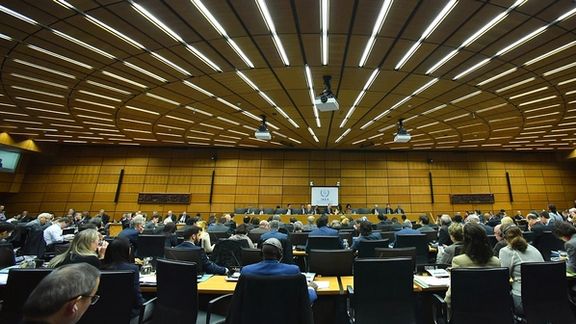
With the dust still settling after United States and Israeli elections, next week may open a new phase of controversy in Iran’s nuclear program.
The November 24-26 board meeting of the United Nations’ International Atomic Energy Agency (IAEA) will likely see a fresh resolution censoring Tehran over restricted access to agency inspectors. Reports emerged Friday that the United States, France, Germany, and the United Kingdom, were circulating to the board’s 35 member-states a draft resolution calling it “essential and urgent” for Iran to address agency unease.
IAEA concerns are twofold. Firstly, as highlighted by the resolution, Tehran has not satisfied the IAEA over uranium traces found in sites used for pre-2003 nuclear work. There is little expectation of a breakthrough in meetings with Iranian officials planned for later this month.
Ned Price, the US State Department Spokesman, Thursday accused Iran of “foot-dragging.” Tehran has demanded the IAEA drop questions over the uranium traces to help talks, currently frozen, to restore the 2015 Iran nuclear agreement, the JCPOA (Joint Comprehensive Plan of Action), which the US left in 2018.
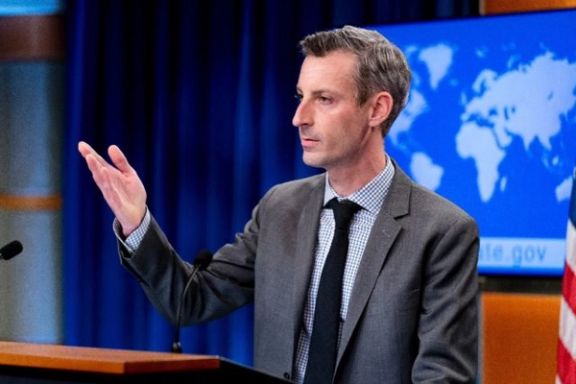
The agency’s second main area of concern is Iran’s reducing since February 2021 IAEA general access to the nuclear program, which is now broadly as required under the Nuclear Non-Proliferation Treaty rather than as enhanced by the JCPOA.
This downgraded access, coupled with the issue of uranium traces, has led agency director-general Rafael Mariano Grossi to warn he may no longer be able to verify the peaceful nature of Iran’s nuclear program. A report circulated Thursday to IAEA member states noted that “the longer the current situation persists the greater such uncertainty becomes.”
The agency monitors Iran’s uranium stockpiles, which it currently reports at 3,674kg, way above the 267kg JCPOA cap, including 62kg enriched to 60 percent, close to 90 percent ‘weapons grade.’ But Iran’s removal of monitoring equipment in factories where it makes centrifuges, machines that enrich uranium, has stymied the agency’s ability to judge the overall program. While access to such factories is not required under Iran’s NPT commitments, knowing the number and type of centrifuges Iran has ready and waiting is crucial to assessing how quickly the program can expand.
While Price said Thursday the US was consulting its “European partners,” options for effective action appear limited. The IAEA board passed a resolution June censoring Iran over the uranium traces, and it far from clear what a new resolution might achieve. The draft text, as reported by Reuters Friday, says Iran should “act to fulfil its legal obligations and... without delay…provide all information, documentation, and answers” required by the IAEA, as well as “access to locations and material…[and the] taking of samples…”
Unlike 2006, when the IAEA referred Iran to the United Nations Security Council over its atomic program, Russia and China would no longer back the move. Both hold UNSC vetoes and see the US as primarily responsible for the JCPOA’s demise.
Even though decisions over JCPOA restoration rest with President Joe Biden, JCPOA critics in the US may feel emboldened by the swing away from the Democrats in the November 8 Congressional elections, even if control of both the House of Representatives and the Senate remains unclear.
‘Acting with judgement’
The looming return to office in Israel of Benjamin Netanyahu after November 1 Knesset elections is another complication. Outgoing prime minister Yair Lapid developed a good relationship with the Biden administration although critical of efforts to revive the JCPOA, whereas Netanyahu previously identified with President Donald Trump. Outgoing Defense Minister Benny Gantz Wednesday talked up work done by the outgoing administration in preparing for military strikes on Iran, suggesting Netanyahu would now “act with judgement.”
While the Ukraine crisis, Iran’s wave of internal protests, and Tehran’s growing links with Moscow have all brought the US closer to the three European JCPOA signatories – France, Germany, and the UK – Biden’s alternatives appear limited.
Given “Iran’s dangerous proliferation of weapon systems to Russia,” Price said Thursday the US would “continue to vigorously enforce all US sanctions on both the Russian and Iranian arms trade.” He conceded that while Washington was “looking at all appropriate tools” for dealing with Iran, it was already “very heavily sanctioned, to say the least…for the full range of their nefarious activities.”
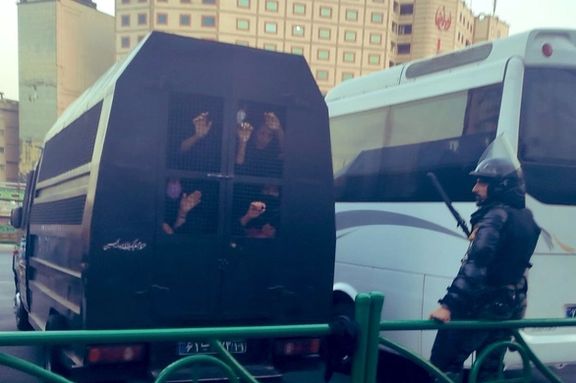
Both supporters and opponents have criticized Iran’s embattled Reform Front for a statement it issued this week presenting its position over current protests.
While critics from within the reform camp took issue with the slow reaction of the group and minimal demands, Iran’s conservatives lashed out at reformists for not criticizing foreign countries for their alleged support of the uprising. Others slammed the Reform Front for being part and parcel of the authoritarian regime in Tehran and its partner in crimes against human rights and dignity of Iranians.
The November 9 statement said that "the protests are the outcome of many years of denial of the people's problems [by the government] and refusal to recognize them, as well as being the product of accrued and unsolved issues, such as humiliation and suppression of the people. It added that many statements by officials, including the joint statement by the Iranian intelligence agencies [threatening protesters] are in fact part of the problem, and not part of a solution for the country's political deadlock."
Former reformist lawmaker Parvaneh Salahshuri quoted a part of the statement that said "The reform front is prepared to hold dialogue and exchange views with the government" on finding a solution for the country's current problems. Possibly referring to the isolation imposed on the reformists by the core of the regime and their lack of popularity among the people, Salahshuri asked: "Is the reform front aware of its status among the people and in the government?"
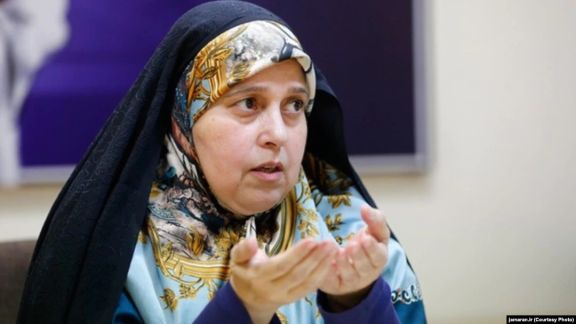
Iranian voters seem to have turned their back to reformists for their poor performance at the previous parliament and as part of the previous administration.
Political activist and influencer Mohammad Hassan Karimi wrote: "The reformists' statement will have very little if any impact on what is going on in Iran. The reform leaders' ideas are based on surrendering to and glorifying the absolute despotic rule of one individual, the Guardian Council's discretionary supervision of political processes and the military's increasing domination in the country...This could have been good one day, but not now!"
Meanwhile, the Revolutionary Guard’s (IRGC) daily newspaper Javan lashed out at the Reform Front in a commentary and called it repetitive and and an attempt to blame the government for their own problems. Javan also criticized the group "for its silence during the past 50 days and for not distancing itself from the rioters, and for taking advantage of the demands made during the protests by trying to usurp them."
Meanwhile, many social media users criticized the statement and described it as a desperate attempt by reformists to beg a share of political power from hardliners. In its two final paragraphs, the statement, which supported the government's position on the protests and criticized foreign governments' support for protesters, it offered to help the government: "We on our part would like to suggest practical ways out from the crisis and discuss if the government is inclined to listen to them and implement them."
Many twitter users have particularly attacked this part of the statement. Some Twitter users called this part the statement's main shortcoming. One Twitter user wrote that is one step ahead of the individual statements made by some reformist leaders, but at the same time, it is hundreds of steps behind the people's demands. The user also pointed out that it is not clear who the statement is addressing, and what is the reformists' next step if the government refuses to accept their way out of the crisis.
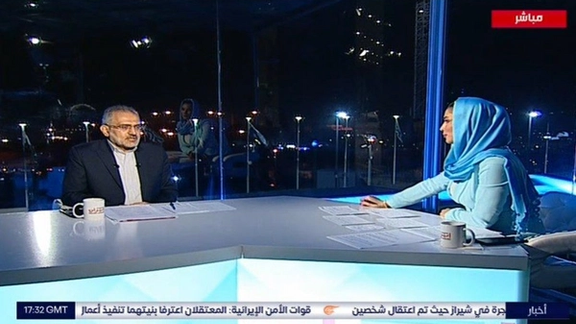
The Iranian vice president for parliamentary affairs has threatened that the Islamic Republic will respond to anyone involved in the current protests anywhere in the world.
Mohammad Hosseini made the remarks during a Thursday interview with Al Mayadeen TV, a media outlet close to Iran-backed Lebanese militant organization Hezbollah.
"We'll respond wherever necessary, even in other countries, as we did in the case of Iraqi Kurdistan. We may even take some actions and not announce them," he said.
The intelligence services of the US, the UK, France, Israel and Saudi Arabia are conspiring against the Islamic Republic round the clock, he claimed, adding that “even some European embassies” tried to provoke people during the recent protests and were consequently warned.
Referring to the ongoing protest and strikes across the country and its coverage by Iran International and other foreign-based Persian-language media, he said, “We now consider Iran International as a terrorist network. Many of its elements inside the country have been arrested.”
He added that “Iran International, Manoto, BBC, etc. have started a media tsunami against the Islamic Republic and its people,” claiming that “They based their work on the big lie of killing Mahsa Amini [by hijab police], someone who had been sick since childhood.”
On Thursday, Iranian intelligence arrested Elham Afkari, claiming that she was “an agent” of Iran International. Afkari is the sister of Iranian wrestler Navid Afkari who was executed in September 2020, after participating in protests. Earlier in the week, two of our journalists were notified of threats to their lives by the UK Police.
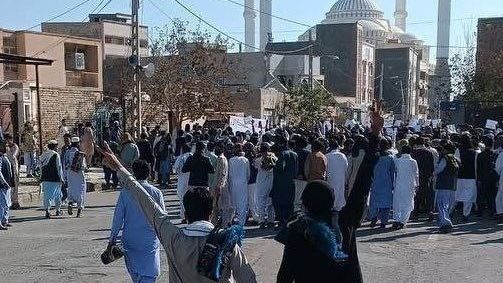
Security forces have again cracked down on protesters who took to the streets and chanted against the Supreme Leader and the IRGC in southeastern Iran on Friday.
Videos posted on social media show thousands marching in the streets of Sistan and Baluchistan province capital Zahedan and other predominantly Sunni Baluchi population centers of Khash, Iranshahr (Pahreh or Bahreh), Rask, the border town of Pishin, strategic port city of Chabahar, and Saravan.
The leader of the Baluch people Molavi Abdolhamid also in his Friday sermon harshly criticized Supreme Leader Ali Khamenei’s rule.
In videos posted on social media from Zahedan, Khash, Rask, Saravan,and Iranshahr gunshots are heard but no casualties have been reported yet, except in Iranshahr where several have reportedly been wounded.
Protesters in Zahedan and other cities took to the streets after Friday prayers chanting “Down with the Dictator,” “Death to Khamenei”, and “I’ll kill those who killed my brother,”. Videos also show people chanting slogans against the IRGC and its militia, the Basij as well as “From Zahedan to Tehran, I will give my life for Iran”.
Protesters also carried posters of Khodanour Lajoie, a young man shot to death on October 1. A photo of Lajoei chained to a lamppost by the police several months ago has turned into a symbol of government’s injustice in impoverished Sistan and Baluchestan.
In his sermon at Maki Mosque in Zahedan this week, popular Sunni religious leader Abdolhamid, officially known as Molavi Shaikh Abdolhamdid Esmailzehi, once again blasted the use of lethal force against protesters in Baluchestan and elsewhere in Iran.
“A government with which people are dissatisfied is no good and has to be toppled,” he said and demanded the release of all those arrested in the protests across the country. He also blasted those lawmakers who recently demanded the death sentence for some protesters. “In Khamenei’s rule there is no freedom. Which political party or group is free? We have neither freedom of speech, nor freedom of media,” he added in unprecedented criticism against the Supreme Leader.
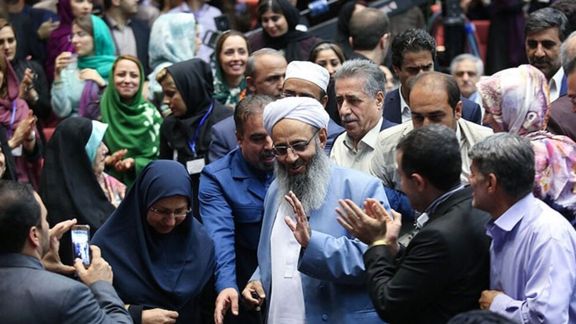
The Sunni cleric also demanded punishment for those responsible for killing Baluch protesters and refuted claims of separatism brought against them by the government. He alleged that security forces tried to bribe the families of the victims with money to remain silent, which they rejected. “They said they didn’t want money; they wanted their dignity to be preserved.”
Security forces used live ammunition to disperse protests in Khash on November 4, killing at least 18 protesters and bystanders, including two children. “This latest deadly incident in Sistan and Baluchistan province reveals that protesters from the oppressed Baluchi minority have borne the brunt of the security forces’ particularly vicious crackdown on demonstrations,” , Amnesty said in a report released November 10.
The report said evidence gathered by the organization “points to a pattern that has emerged in Sistan and Baluchistan province over the past five weeks” of the use of lethal force to against Baluchi protesters.
The global rights watchdog reiterated its call on the international community to take urgent action to stop further killings of protesters in the province and across Iran. “The UN Human Rights Council must help break this cycle of systemic impunity by establishing an independent investigative and accountability mechanism to investigate crimes under international law and other serious human rights violations committed in Iran,” Amnesty said.
Abdolhamid’s call for a referendum with the presence of international observers to decide the future form of government in Iran has hugely angered hardliners. He recently expressed more liberal views about the role of women in society after being criticized by some Baluch activists for not mentioning women and acknowledging gender equality in his fiery Friday prayer sermons.
Reports about the alleged rape of a 15-year-old Baluch girl in June by a police commander in Chabahar, who has remained immune to prosecution, sparked protests in Zahedan on September 30. At least 100 protesters were reportedly killed in the province since then.

Amid international concerns over the Islamic Republic’s violent crackdown on dissent, its foreign minister has warned the UN Human Rights Council over organizing any session to discuss the situation.
In a phone conversation with UN Secretary General Antonio Guterres Thursday night, Foreign Minister Hossein Amir-Abdollahian warned of the “negative consequences” of the UNHRC’s “political measure” on cooperation between the Islamic Republic and the West, referring to calls for a special meeting over the deadly clampdown on the current protests across Iran.
Alleging that the Islamic Republic has "deeply exercised restraint" in the ongoing unrest – which has left over 300 protesters dead and about 15,000 detained, he told the UN chief that such a meeting should be held for countries that "promote violence and terror."
“The UN Human Rights Council should hold sessions for governments that are encouraging violence and terror, not for the Islamic Republic of Iran which is a true defender of human rights and has exercised great restraint during recent riots,” he said.
Amir-Abdollahian added that “Contrary to the UN Charter, a few Western countries exploited the peaceful demands in Iran and encouraged violence and offered tutorials on building weapons and Molotov cocktails on media and social networks which led to the killing of police and insecurity in Iran.”
Iranian officials have been accusing “enemies” of fomenting protests, but so far have not presented any evidence.
He also claimed that “technical” negotiations between Iran and the International Atomic Energy Agency (IAEA) are at “appropriate” levels, despite remarks by the head of the UN’s nuclear watchdog. Rafael Mariano Grossi said Wednesday Iran did not offer anything new during a recent meeting in Vienna to resolve major differences.